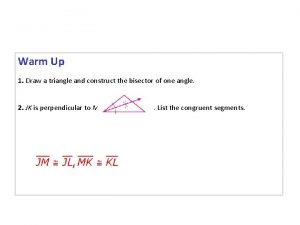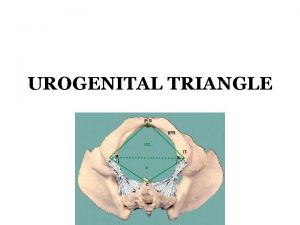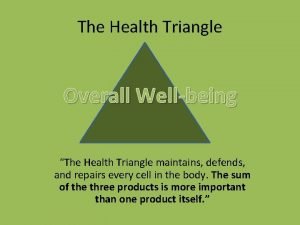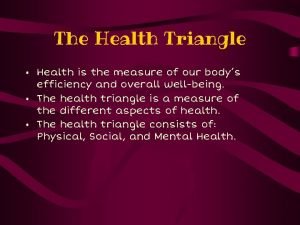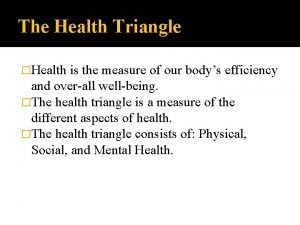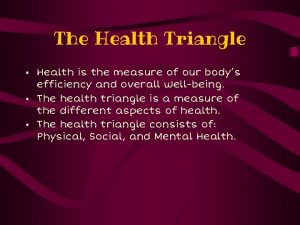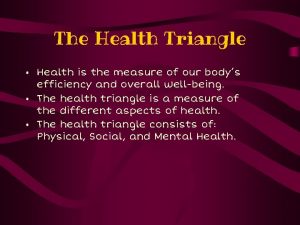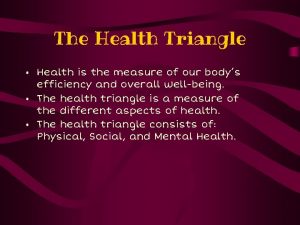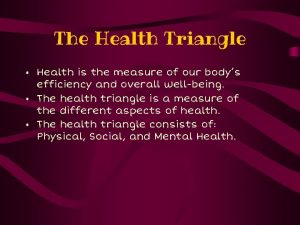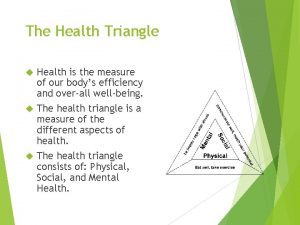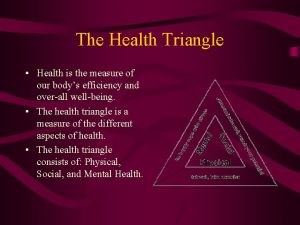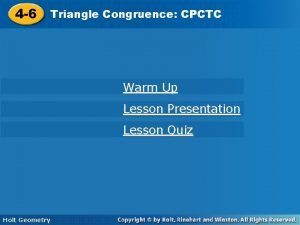The Health Triangle Health is the measure of

























- Slides: 25

The Health Triangle • Health is the measure of our over-all well-being (combination of M/E, S, P Health). • The health triangle is a measure of the different aspects of health. • The health triangle consists of: Physical, Social, and Mental Health.

Social Health • Social Health deals with the way we react with people within our environment. • This includes: public health, family relationships, and peer relationships.

Social Health Public Health • Public health includes disease prevention and promoting health through good decision making. (visit dentist, regular dr. visits, grocery store, restaurants, etc) • Keeping yourself safe and healthy benefits your community as a whole. • 1. Why would public health matter when someone is considering their overall health?

Social Health Family Relationships • A healthy family relationship is one that is supportive, loving, responsible, and balanced. • Families should work together to eliminate stress and negativity in the home. Promoting a safe and enjoyable environment. • 2. Identify 2 negative and 2 positive family interactions that could impact YOUR social health…WHY?

Social Health Peer Relationships • Strong and supportive friendships increase happiness, self-esteem, and reduces stress. • This also includes how you interact with classmates, co-workers, teammates, clubs, organization, church groups, etc.

Mental/emotional Health • Mental health is: how we think, feel and cope with daily life. • Mental health encompasses: Selfesteem, learning, stress management, and mental illnesses or disorders.

Mental Health Learning • Learning is the development of skills, behaviors, and knowledge. Everyone learns at a different pace (visual, auditory, kinesthetic) • Learning increases self-confidence, awareness, and self perception. It also teaches one coping skills. • 3. Have you ever experienced a learning health issue? Not prepared, don’t understand a certain teacher, create or tear down confidence? Tell me about this experience and what it did to you or how you dealt with it.

Mental Health Self-Esteem The way one feels about themselves Question: How is self-esteem formed? • Family (how do they talk to you, what are the expectations placed on you, praise vs criticism) • • Boyfriends/Girlfriends (Trust, forgiveness, Pedestal) Friends/Peers/Teammates Teachers/Coaches Co-workers

Developing Positive Self-Esteem • • Set goals and make plans to reach them. Develop a skill or talent (auto, building) Make a list of things you do well Work to do your best in school • • Be involved in clubs or community activities Choose friends who encourage others to do their best Volunteer to help others 4. What are some ways you can think of that help you with positive self-esteem?

Mental Health Stress Management • The physical or psychological reaction to the challenges you face. • It is important to learn healthy ways to deal with stress or you could be at risk for anxiety or depression.

101 ways to cope with Stress • • Not all of these ideas apply to everyone, but hopefully you can find a few that will work for your situation! Get up fifteen minutes earlier • Prepare for the morning the night before • Avoid relying on chemical aids • Set appointments ahead • Don’t rely on your memory … write it down • Practice preventative maintenance • Make duplicate keys • Say no more often • Set priorities in your life • Avoid negative people • Use time wisely • Simplify meal times • Always make copies of important papers • Anticipate your needs • Repair anything that doesn’t work properly • Ask for help with the jobs you dislike • Break large tasks into bite size portions • Look at problems as challenges • Look at challenges differently • Unclutter your life. Smile • Be prepared for rain • Tickle a baby • Pet a friendly dog/cat • Don’t know all the answers • Look for the silver lining • Say something nice to someone • Teach a kid to fly a kite • Walk in the rain • Schedule play time into: every day • Take a bubble bath • Be aware of the decisions you make • Believe in you • Stop saying negative things to yourself • Visualize yourself winning • Develop your sense of humor • Stop thinking tomorrow will be a better day • Have goals for yourself • Dance a jig • Say hello to a stranger • Ask a friend for a hug • Look up at the stars • Practice breathing slowly • Learn to whistle a tune • Read a poem • Listen to a symphony • Watch a ballet • Read a story curled up in bed • Do a brand new thing • Stop a bad habit • Buy yourself a flower • Take stock of your achievements • Find support from others • Ask someone to be your “vent-partner” • Do it today • Work at being cheerful and optimistic • Put safety first • Do everything in moderation • Pay attention to your appearance • Strive for excellence NOT perfection • Stretch your limits a little each day • Look at a work of art • Hum a jingle • Maintain your weight • Plant a tree • Feed the birds • Practice grace under pressure • Stand up and stretch • Always have a plan “B” • Learn a new doodle • Memorize a joke • Be responsible for your feelings • Learn to meet your own needs • Become a better listener • Know your limitations and let others know them too • Tell someone to have it good day in pig latin • Throw a paper airplane • Exercise every day • Learn the words to a new song • Get to work early • Clean out one closet • Play patty cake with a toddler • Go on a picnic • Take a different route to work • Leave work early (with permission) • Put air freshener in your car • Watch a movie and eat popcorn • Write a note to a far away friend • Go to a ball game and scream • Cook a meal and eat it by candlelight • Recognize the importance of unconditional love • Remember that stress is-an attitude • Keep a journal • Practice a monster smile • Remember you always have options • Have a support network of people, place and things • Quit trying to “fix” other people • Get enough sleep • Talk less and listen more • Freely praise other people • P S. Relax, take each day at a time … you have the rest of your life to live.

Short or long term? Acute Vs Chronic A= sudden or short lived (hours or days) C= continue over a long period of time (unsafe neighborhood or loved one who is ill) • The impact these stressors have on your life depends on how YOU react to them!!!

Stressors: Any factor that cause stress • • Family relationships School work Peer groups Fatigue Injury Illness Disabilities Death of family or loved one Money Acceptance Discrimination Environment: poverty, pollution, noise, natural disasters, etc. • Perception: the way you see things • Alcohol, tobacco, drugs • Separation or divorce • •

Positive vs Negative Eustress: “Good” stress, when stress results form something good and you react in a positive manner. • Provides energy & motivation • Makes you more creative, alert, assertive, dedicated to a task & can help you achieve your goals • Makes you feel good about your self • 5. What are some examples of positive stress that you have encountered in your life?

Reacting To Stress Alarm Stage/fight or flight: where the body and mind go on high alert…your body utilizes all of its resources to fight off the threat by either attacking or “taking flight” escaping the stressor. • Involuntary actions may be activated • Adrenaline is then produced: “emergency hormone” • Increased heart rate • Respiration becomes faster

Reacting To Stress • Resistance Stage: keeps blood pressure and hormones, such as adrenaline and cortisol, higher than normal. If we do not find some way of easing our load or coping with the stressor, we end up in the third stage of stress. • Resistance stage is where people in extremely high-stress situations, appear to have super human strength (could be good or bad). 3 stages of stress (5 min) • Exhaustion: this results in a tired feeling that lowers one’s level of activity. • build of lactic acid (waste in the muscle) which will cause someone to experience high levels of soreness & tiredness

Mental Health Mental Disorders • Stress and problems with school, friends, and family can cause mental illnesses. • Mental illnesses include: depression, bipolar disorder, schizophrenia, and phobias.

Physical Health • Physical health deals with the body’s ability to function. • Physical health has many components including: exercise, nutrition, sleep, alcohol & drugs, and weight management.

Physical Health Exercise • Exercise is the act of using your muscles to stay physically fit. • Exercise helps to give you more energy, maintain weight, increase confidence, self esteem, and helps to battle chronic diseases.

Physical Health Nutrition • Proper balanced meals are essential in leading a healthy life. • Nutritious meals create a balance between what we eat and the way our body uses the food for energy and growth.

Physical Health Sleep • It is recommended that the average person get at least 8 hours of sleep. • The human body likes regularity, so try to go to bed and wake up at the same time daily. • 6. Why do we need sleep? What happens during this time?

Physical Health Alcohol & Drugs • Alcohol and other drugs interfere with messages to the brain and alters perception. • Use of such substances puts you at risk for unwarranted physical health issues like liver disease, lung cancer, heart disease, accidental injuries, car crashes, trouble with the law, unwanted pregnancies, and fights.

Physical Health Weight Management • Maintaining a healthy weight decreases your risk of certain diseases such as heart disease and diabetes. • Exercise and proper nutrition helps to maintain healthy weight levels.

Lifestyle Factors These are health factors that we can control, which impact our health and wellness. • 1. Getting between 7 -9 hours of sleep per night • 2. Eat nutritious foods from the various food groups each day • 3. Refrain from using tobacco, alcohol, and drugs • 4. Eat Breakfast • 5. Do 60 -90 minutes of physical activity each day • All of these thing help you build or maintain your overall well-being.

The Health Triangle Review • There are 3 major areas of the health triangle: physical, mental and social. • Good decision making and healthy choices reduce the risk of disease and increase health overall.
 Is measure for measure a comedy
Is measure for measure a comedy Barometer
Barometer Triangle hjk is an isosceles triangle with hj=hk
Triangle hjk is an isosceles triangle with hj=hk Triangle pse is similar to triangle tsv
Triangle pse is similar to triangle tsv Calot triangle and hepatocystic triangle
Calot triangle and hepatocystic triangle Sierpinski triangle pascal's triangle
Sierpinski triangle pascal's triangle How to measure plant health
How to measure plant health Hát kết hợp bộ gõ cơ thể
Hát kết hợp bộ gõ cơ thể Bổ thể
Bổ thể Tỉ lệ cơ thể trẻ em
Tỉ lệ cơ thể trẻ em Gấu đi như thế nào
Gấu đi như thế nào Thang điểm glasgow
Thang điểm glasgow Hát lên người ơi
Hát lên người ơi Các môn thể thao bắt đầu bằng từ đua
Các môn thể thao bắt đầu bằng từ đua Thế nào là hệ số cao nhất
Thế nào là hệ số cao nhất Các châu lục và đại dương trên thế giới
Các châu lục và đại dương trên thế giới Cong thức tính động năng
Cong thức tính động năng Trời xanh đây là của chúng ta thể thơ
Trời xanh đây là của chúng ta thể thơ Mật thư tọa độ 5x5
Mật thư tọa độ 5x5 Phép trừ bù
Phép trừ bù độ dài liên kết
độ dài liên kết Các châu lục và đại dương trên thế giới
Các châu lục và đại dương trên thế giới Thể thơ truyền thống
Thể thơ truyền thống Quá trình desamine hóa có thể tạo ra
Quá trình desamine hóa có thể tạo ra Một số thể thơ truyền thống
Một số thể thơ truyền thống


